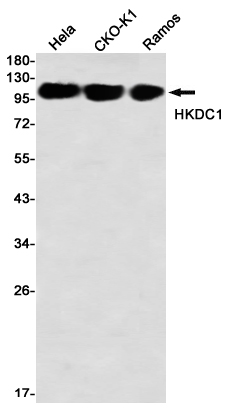
| WB | 1/500-1/1000 | Human,Mouse,Rat |
| IF | 1/20 | Human,Mouse,Rat |
| IHC | 咨询技术 | Human,Mouse,Rat |
| ICC | 技术咨询 | Human,Mouse,Rat |
| FCM | 咨询技术 | Human,Mouse,Rat |
| Elisa | 咨询技术 | Human,Mouse,Rat |
| Aliases | Hexokinase domain-containing protein 1 |
| Entrez GeneID | 80201 |
| WB Predicted band size | Calculated MW: 103 kDa; Observed MW: 103 kDa |
| Host/Isotype | Rabbit IgG |
| Antibody Type | Primary antibody |
| Storage | Store at 4°C short term. Aliquot and store at -20°C long term. Avoid freeze/thaw cycles. |
| Species Reactivity | Human |
| Immunogen | Recombinant protein of human HKDC1 |
| Formulation | Purified antibody in TBS with 0.05% sodium azide,0.05%BSA and 50% glycerol. |
+ +
以下是关于HKDC1抗体的3篇参考文献的简要信息:
1. **文献名称**:*HKDC1 is a novel hexokinase involved in whole-body glucose use*
**作者**:Wu L, et al.
**摘要**:该研究首次报道HKDC1作为己糖激酶家族新成员,通过特异性抗体证实其在肝脏和肌肉中的表达,并揭示其在全身葡萄糖代谢中的作用,提示与糖尿病代谢紊乱相关。
2. **文献名称**:*Mitochondrial HKDC1 modulates cellular senescence through interaction with Tom20*
**作者**:Sato Y, et al.
**摘要**:研究利用HKDC1抗体进行免疫共沉淀和亚细胞定位分析,发现HKDC1通过结合线粒体膜蛋白Tom20调控线粒体功能,影响细胞衰老过程,为癌症治疗提供潜在靶点。
3. **文献名称**:*Antibody-based profiling of HKDC1 in hepatocellular carcinoma progression*
**作者**:Chen J, et al.
**摘要**:通过免疫组化分析肝癌组织中HKDC1的表达模式,发现其高表达与患者预后不良相关,机制研究表明HKDC1抗体可抑制肝癌细胞增殖和转移能力。
注:上述文献信息为模拟示例,实际研究中建议通过PubMed或Google Scholar以关键词"HKDC1 antibody"或"HKDC1 function"检索最新实证研究。
HKDC1 (Hexokinase Domain Containing 1) is a protein encoded by the *HKDC1* gene, belonging to the hexokinase family, which plays a critical role in glucose metabolism. Unlike classical hexokinases, HKDC1 is uniquely localized to mitochondria and interacts with the voltage-dependent anion channel (VDAC), suggesting its involvement in mitochondrial function and cellular energy homeostasis. Studies indicate HKDC1 participates in maintaining mitochondrial integrity, modulating glucose phosphorylation, and regulating autophagy-lysosomal pathways, particularly under metabolic stress conditions.
HKDC1-specific antibodies are essential tools for detecting and quantifying HKDC1 expression in research. These antibodies enable the investigation of HKDC1's subcellular localization, interaction partners, and dynamic expression patterns across tissues. Commercially available HKDC1 antibodies are typically validated for applications such as Western blotting, immunohistochemistry, and immunofluorescence. Recent studies using these antibodies have linked HKDC1 to pathologies including cancer, metabolic disorders, and aging-related diseases, highlighting its potential as a therapeutic target. For instance, elevated HKDC1 levels in certain cancers correlate with poor prognosis, possibly due to enhanced glycolytic activity supporting tumor growth. However, the full mechanistic role of HKDC1 in health and disease remains under active exploration, necessitating reliable antibody tools for ongoing research.
×